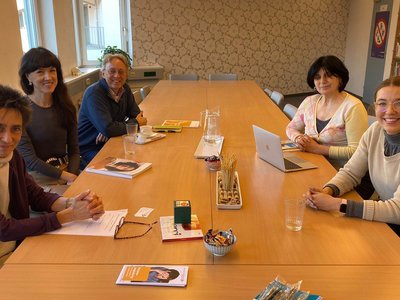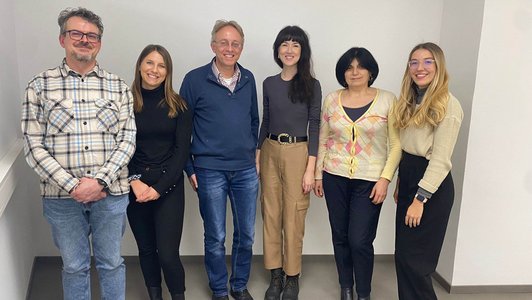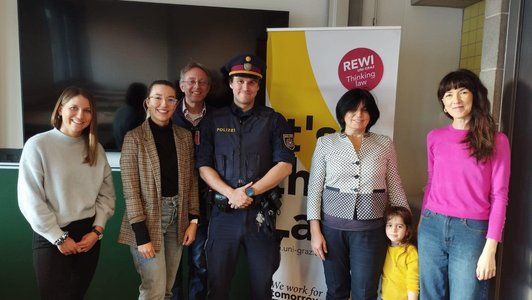

From 5 to 9 February, a delegation from New Vision University (NVU, Georgia) visited the University of Graz as well as the Medical University of Graz for kicking off the project “Building Strength and Commitment to Counter Violent Crime: From Academic Interventions to Societal Transformation” (COVIOCRIM). The delegation was led by Dr. Tamara Laliashvili, representing NVU’s Centre for Comparative and European Criminal Law.
COVIOCRIM is a project proposed to address the training of first responders to domestic violence and violence against women and girls in Georgia. It aims to create an academic partnership to offer certificate programmes for “first responders” to violence (police and correctional officers, social workers, nurses and doctors) as well as modules for a future Master programme in criminal law and criminal justice at NVU. Similar to Austria, Georgian society has been shocked by a wave of femicides. And indeed, during the conversations in Graz the themes of “vulnerability” and “remoteness” emerged over and over. Both countries have ratified the Istanbul Convention on Preventing and Combating Violence Against Women and Domestic Violence, and both have to address the issue of mountainous regions away from urban centres where police and medical support is difficult to come by.
The visit was hosted by Dr. Nina Kaiser of the University of Graz’ Hans Gross Centre for Interdisciplinary Criminal Sciences (ZiK), along with Dr. Isabella Klasinc of Medical University of Graz, representing the Clinical Forensic Medical Examination Centre. The latter is Austria’s only specialized centre where victims of physical and / or sexual violence are offered forensic medical examinations to identify and preserve the traces of violence for evidentiary purposes. The Centre is pioneering the use of so-called “Gewaltambulanzen”, a central plank in the Austrian Federal Government’s policy to establish low-threshold forensic examination opportunities throughout the country.
Beyond the clinical-forensic part of the visit, the group from NVU was introduced by Dr. Kaiser to the work of “Gewaltschutzzentrum” (Violence Prevention Centre in Styria) and “Neustart” (the Austrian Probation Service). Both play a critical role in implementing the Austrian Security Police Act with regard to prohibition of entry and approach orders. A novelty in Austrian law is the offender’s obligation (after having come under such an order) to obtain 6 hours of mandatory violence protection counselling with a Violence Prevention Centre. Another novelty is the Austrian Government’s commitment to having specially trained violence protection officers at every police station in the country. They obtain a specific training on violence prevention and proactively work with victim protection facilities. Thanks to ZiK, the group was able to discuss these innovations both online with the Federal Criminal Intelligence Service’s unit on domestic violence in Vienna and offline with a representative of the local police in Graz.
Finally, the group was happy to meet with em. Prof. Wolfgang Benedek, a “veteran” of the APPEAR programme, to discuss the methodology of APPEAR based on his experiences with implementing the APLHRE project - Academic Partnership on Legal and Human Rights Education.
A short news article about the kick-off meeting was also published on the website of NVU.


